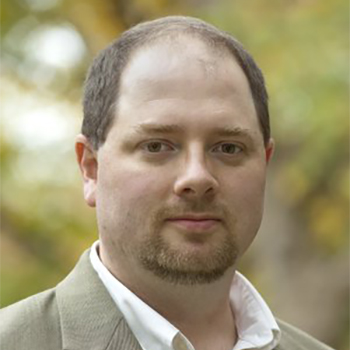Erik C. Nisbet

Erik C. Nisbet (Ph.D., Cornell University) is the Owen L. Coon Endowed Professor of Policy Analysis & Communication and director of the Center for Communication & Public Policy in the School of Communication at Northwestern University. His research lies at the intersection of media, public opinion, and public policy in the areas of science, technology, and environmental policy, democracy and elections, and international security. An expert on cross-national survey methodology and field experiments, Erik has led research projects in the United States, Russia, Ukraine, Serbia, Turkey, Iran, France, Great Britain, Germany, Poland, and several Arab countries. His research has been supported by multiple grants from the National Science Foundation, Office of the Director of National Intelligence, and the U.S. Department of States.
Education
- Ph.D. Communication and Comparative Politics, Cornell University
- M.S. Communication, Cornell University
- B.A. Government and International Relations, Cornell University
Affiliations
- Director, Center for Communication & Public Policy
- Non-residential faculty fellow, USC Center on Public Diplomacy
- Non-residential faculty affiliate, OSU Mershon Center for International Security Studies
- Co-Principal Investigator, Comparative National Elections Project (CNEP)
Recent Academic Publications
- Osborne, M.A., Malloy, S., Nisbet, E.C., Bond, R.M., Tien, J.H. (2022). Sentinel node approach to monitoring online COVID-19 misinformation. Scientific Reports. 12
- Dal, A. and Nisbet, E.C. (in press). To share or not to share? How emotional judgements drive online political expression in high-risk contests. Communication Research
- Padamsee, T., J., Bond, R.M., Dixon, G.N., Hovick, S.R., Na, K., Nisbet, E.C., Wegener, D.T., Garrett, K. (2022). Changes in COVID-19 Vaccine Hesitancy Among Black and White Americans. JAMA Network Open 5
- Nisbet, E.C., C. Mortenson, Q. Li (2021). The presumed influence of election misinformation on others reduces our own satisfaction with democracy. The Harvard Kennedy School Misinformation Review 1, no. 7 (2021).
- Nisbet, E.C. and Kamenchuk, O. (2021). Russian news media, digital media, informational learned helplessness, and the belief in COVID-19 misinformation. International Journal of Public Opinion Research. 33 (3), 571-590
- Stoycheff, E., Nisbet, E.C., and Epstein, D. (2020). Differential effects of capital-enhancing and recreational Internet use on citizens' demand for democracy. Communication Research. 47(7), 1034-1055.
- Nisbet, E.C. and Kamenchuk, O. (2019). The psychology of state-sponsored disinformation campaigns and implications for the future of public diplomacy. The Hague Journal of Diplomacy. 14(1-2), 65-82
- Wojcieszak, M.E., Nisbet, E.C., Kremer, L., Behrouzian, G., Glynn, C. (2019). What drives media use in autocratic regimes? Extending selective exposure theory to Iran. International Journal of Press Politics 24(1), 69-91
- Gunther, R., Beck, P.A., Nisbet, E.C. (2019). Fake News' and the Defection of 2012 Obama Voters in the 2016 Presidential Election. Electoral Studies. 61
- Guo, T., Nisbet, E.C., Martin, J. (2019). Identifying mechanisms of environmental decision-making: How ideology and geographic proximity influence public support for regulating agricultural runoff to curb harmful algal blooms. Journal of Environmental Management. 241 (1), 264-272
Published Essays and Analysis
- The Conversation: American influence could take the hit as Putin, Zelenskiy try to make peace in Ukraine (2019)
- The Conversation: What Ukrainians think about Trump and his "quid pro quo" in 3 charts (2019)
- The Conversation: Trump may owe his 2016 victory to "fake news," new study suggests (2018)
- The Conversation: After summit Russians like Trump more, Americans less (2018)
- The Conversation: 3 charts explain how Russians see Trump and US (2018)
- Center for Public Diplomacy Blog: Stoic Skepticism: How Russians Anticipate the Trump-Putin Summit (2018)
- Vox: The 2016 ground game from the voters' perspective (2018)
- The Conversation: Why Russians support Putin's foreign policy (2016)
- The Conversation: The tragedy of Turkish democracy in five acts (2016)
- The Conversation: Is internet freedom a tool for democracy or authoritarianism? (2016)
- The Conversation: How Russia is building a psychological firewall against the West< (2015)
- Washington Post: Biased interpretations of science? Liberal do it, too. (2015)
Recent media interviews
- FiveThirtyEight: Most Americans haven't stopped trust scientists (May 27, 2020).
- USA Today: You're going to face a tsunami of disinformation again this election, experts warn (February, 24, 2020).
- USC Annenberg: Emotion and Disinformation (October 3, 2019).
- The Globe Post: US falls behind EU in responding to disinformation campaigns (August 3, 2019)
- Associated Press: Deepfake videos pose a threat, but "dumbfakes" may be worse (July 19, 2019)
- BYU Radio: Why do people fall for false stories? Emotions (May 29, 2019)
- Spectrum News 1: Many to blame for misinformation online (May 3, 2019).
Courses
- Communication Studies 380: Political Communication
- Communication Studies 395: Science, Policy, & Communication
- MSC 491 Foundations of Strategic Communication
